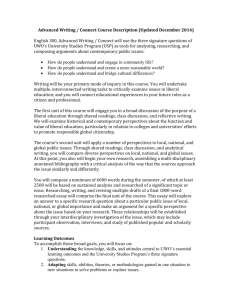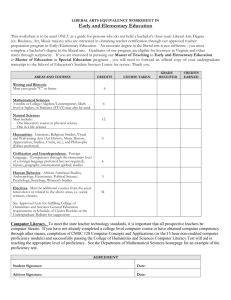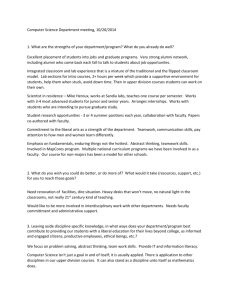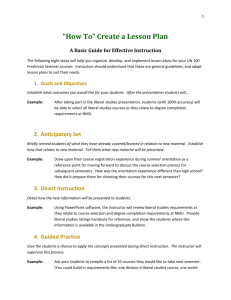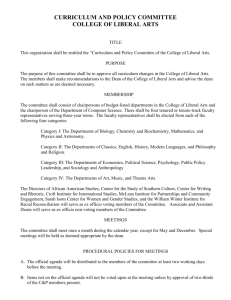Liberal Studies Course Proposal
advertisement
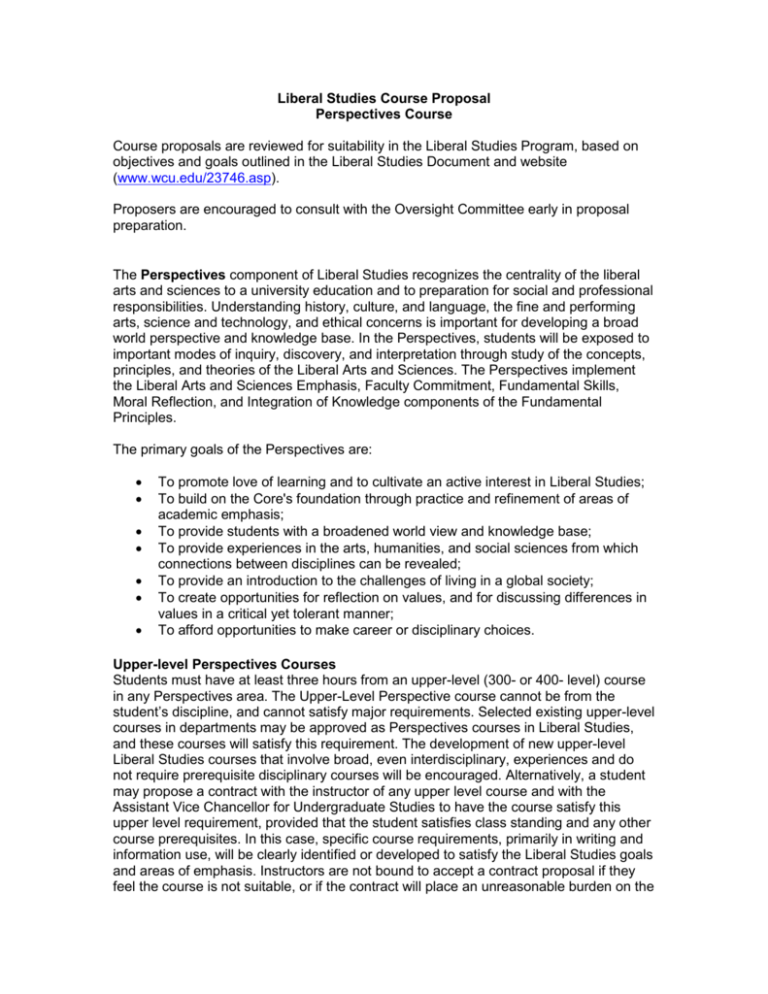
Liberal Studies Course Proposal Perspectives Course Course proposals are reviewed for suitability in the Liberal Studies Program, based on objectives and goals outlined in the Liberal Studies Document and website (www.wcu.edu/23746.asp). Proposers are encouraged to consult with the Oversight Committee early in proposal preparation. The Perspectives component of Liberal Studies recognizes the centrality of the liberal arts and sciences to a university education and to preparation for social and professional responsibilities. Understanding history, culture, and language, the fine and performing arts, science and technology, and ethical concerns is important for developing a broad world perspective and knowledge base. In the Perspectives, students will be exposed to important modes of inquiry, discovery, and interpretation through study of the concepts, principles, and theories of the Liberal Arts and Sciences. The Perspectives implement the Liberal Arts and Sciences Emphasis, Faculty Commitment, Fundamental Skills, Moral Reflection, and Integration of Knowledge components of the Fundamental Principles. The primary goals of the Perspectives are: To promote love of learning and to cultivate an active interest in Liberal Studies; To build on the Core's foundation through practice and refinement of areas of academic emphasis; To provide students with a broadened world view and knowledge base; To provide experiences in the arts, humanities, and social sciences from which connections between disciplines can be revealed; To provide an introduction to the challenges of living in a global society; To create opportunities for reflection on values, and for discussing differences in values in a critical yet tolerant manner; To afford opportunities to make career or disciplinary choices. Upper-level Perspectives Courses Students must have at least three hours from an upper-level (300- or 400- level) course in any Perspectives area. The Upper-Level Perspective course cannot be from the student’s discipline, and cannot satisfy major requirements. Selected existing upper-level courses in departments may be approved as Perspectives courses in Liberal Studies, and these courses will satisfy this requirement. The development of new upper-level Liberal Studies courses that involve broad, even interdisciplinary, experiences and do not require prerequisite disciplinary courses will be encouraged. Alternatively, a student may propose a contract with the instructor of any upper level course and with the Assistant Vice Chancellor for Undergraduate Studies to have the course satisfy this upper level requirement, provided that the student satisfies class standing and any other course prerequisites. In this case, specific course requirements, primarily in writing and information use, will be clearly identified or developed to satisfy the Liberal Studies goals and areas of emphasis. Instructors are not bound to accept a contract proposal if they feel the course is not suitable, or if the contract will place an unreasonable burden on the instructor or on the class as a whole. When a student uses a contract to take an upperlevel perspective course, the student must have the contract completed before the semester begins. Course Prefix and Number: Course Title: Course Proposer(s): Department: Course Catalog Description (copy from front of AA-5): Designate the Perspectives category for this course: P1 Social Sciences P3 History P4 Humanities P5 Fine and Performing Arts P6 World Cultures 1) Describe how this course meets the educational intent of the Perspectives category (excerpted below, from the Liberal Studies Document). Social Sciences (6 hours, courses must be taken in two disciplines): Courses in Social Sciences provide systematic study of observational and analytic methods and findings of those disciplines that focus on the interpersonal functioning and institutional creations of human beings. Courses in this category may focus on the scientific study of the mental and behavioral characteristics of individuals or groups or may focus on the description and explanation of political, economic, or legal institutions. Included will be inquiry into basic social scientific concepts such as mind, behavior, class, society, culture, freedom, government, property, equality, and rights. History (3 hours): The study of history introduces students to a distinctive body of knowledge and to the tools of historical inquiry that shape and define it. History locates people and events in space and time, explaining change and continuity, and the diversity of forces shaping events, institutions, and value systems. The subject of study should be of sufficient breadth to convey an understanding of development over time and of sufficient depth to illustrate the complexity of forces that mold events. The study of history should engage students in the experience of interpreting the record of the past and drawing their own conclusions. Humanities (3 hours): The role of this requirement is to confront students with landmark texts that embody the Western heritage of humanity's attempts to understand itself. These might be in the form of fiction, poetry, dialogue, essay and other appropriate written forms that embody our literary heritage. The texts chosen for study might be thematic in nature or drawn from a specific ethnic or national tradition. They must be of sufficient breadth and depth to probe fundamental issues regarding the human condition. This study might include narrative form, critical textual analysis, or the study of a language, but the first priority must be to engage students in the exploration of the significance of human modes of being, thought, and values in their lives. Fine and Performing Arts (3 hours): Learning in the Fine and Performing Arts courses will be concerned with appreciating, interpreting, and critically analyzing creative works and events, as well as understanding the artistic intentions of the creator. Introduction to traditional and contemporary concepts within the various modes of expression will be achieved through an analysis of individual or collaborative works that includes the study of the nature of self-expression and the critical evaluation of works or events as interpreted through their socio-cultural contexts. An important course component will be out-of-the-classroom experiences such as visits to gallery and museum exhibitions, attendance at theater and musical productions and performances, visiting artists, performers and writers and attending their lectures, readings and presentations. Courses may have an applied component to provide experience with personal artistic expression in order to help the student understand a creative concept or an artist's intention. World Cultures (3 hours): World Cultures courses will involve the study of significant contemporary issues in a global and multi-disciplinary setting. Specifically identified issues of study--which might include the consideration of ethnicity, gender, religion, or race--should illustrate the nature of cultural diversity and global interdependence and the challenges of solving problems and reaching understanding across national and cultural divides. The study of world cultures should actively engage students in the experience of synthesis of information from a variety of disciplines which might include the natural and social sciences, history, the humanities, and the arts. It should also emphasize the responsibility of educated people to be informed about current public issues. 2) Describe how this course will develop and assess student accomplishment in Writing and Information Use and one or more of the following: a) Critical analysis of arguments b) Oral communication c) Service learning d) Moral reflection e) Cultural diversity 3) Describe the student workload, including the types and quantities of reading assignments, writing assignments, examinations, projects, presentations, etc. 4) Indicate how the course will: a) Offer an introduction to the discipline's primary concepts, principles, and theories. b) Offer an intensive exploration and application of selected concepts, principles, theories, and modes of inquiry. 5) List faculty members who are qualified to teach this course. 6) Describe the pedagogical reasons for the best class size for sections of this course. 7) If this course is to be offered at the upper level or is required for your major describe: a) How the course will be designed to accommodate students from a variety of disciplines. b) The department's commitment to teaching upper level students whose primary interest/major is outside the discipline of the department. 8) Optional: Provide additional information that shows how this course particularly addresses the overall objectives of the Liberal Studies Program.
